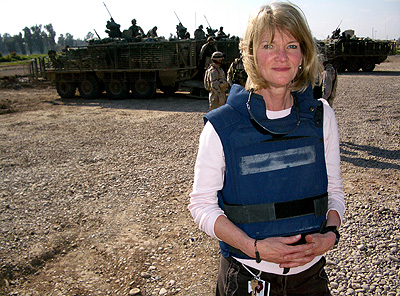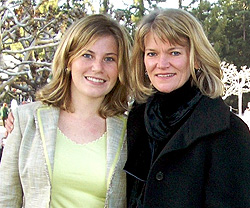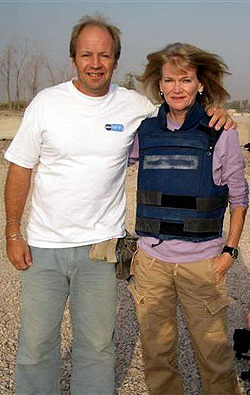UC Berkeley Point of View
 |
Martha Raddatz, then senior national security correspondent for ABC News, in Mosul, Iraq, last year. (All pictures courtesy Greta Bradlee) |
My mother has brought the Iraq war home to millions of Americans - but especially to me
As the Iraq war approaches the beginning of its fourth year, "it is increasingly easy for people to become disengaged from it, to forget about the people who are in the line of fire every day," Greta Bradlee writes below. A staffmember with UC Berkeley's Government Affairs office, Bradlee tells what it's like to have a mother reporting from a war zone. Through her story and those of Operation Iraqi Freedom veterans we have published, the NewsCenter seeks to remind the Berkeley community that while the fighting may be taking place "over there," the impact is intense for many who are right here on campus.
Early Sunday morning, on Jan. 29, my mom called to tell me that ABC anchor Bob Woodruff and cameraman Doug Vogt had been seriously injured in Iraq. "They were out with the Iraqi security forces and their vehicle drove over an IED [improvised explosive device]," she told me, her voice starting to waver. "They have shrapnel in their heads. Bob is unconscious."
 Bradlee with her mother in Berkeley. |
My mom began to cry, and her tears fueled my own. I cried so hard I was gasping for air. I'd obviously heard the horror stories about journalists being wounded, kidnapped, and even murdered in Iraq. But this was different - it could easily have been her.
My mother is Martha Raddatz, chief White House correspondent and former senior national security correspondent for ABC News. This was her network, her anchor, her cameraman. She has made nine trips to Iraq and been on more military "embeds" there than any other Pentagon reporter on TV. Over the past few years, the image of her in a bulletproof vest riding in a Humvee has become quite familiar to me.
My mom has had a few close calls in Iraq. She has seen mortars and rockets land nearby, and she's had to dodge a few IEDs. Despite this, I have never been too nervous about her going to Iraq. I trust her. I know she is not trying to be what they call a hot-dog and that she is taking every possible precaution. She is incredibly knowledgeable about Iraq, and has great contacts with the military personnel who serve as her protectors.
Another reason I don't worry too much is that she doesn't, or, if she does, she never shows it. But when she called me on Sunday to tell me about the attack on Bob and Doug, I sensed the fear in her voice. For the first time, I was truly scared.
Bob and Doug are both friends of my mom's. She and Doug have been embedded together with U.S. forces in Iraq on many occasions. Just last Friday, Bob e-mailed her about his upcoming patrol with the 4th Infantry Division in Taji. "Tell me everything you know, girlfriend," he wrote.
 ABC News cameraman Doug Vogt, who along with anchor Bob Woodruff was injured last week by a roadside bomb, with Raddatz on a previous assignment. |
Why do people like my mom, Bob and Doug do what they do? They certainly don't have to go to these battle zones. Why do they take those risks?
As my mom told Larry King in a recent interview, "We have more than 135,000 U.S. troops in Iraq right now. It is so important for me to go over there and cover what they do, and you cannot do that from the Pentagon. I feel very strongly that you have to go over there."
She continued, "You have to get the depth. And Bob wants that and Elizabeth [Vargas, Woodruff's co-anchor on "World News Tonight"] wants that, and they are willing to go over there and take risks, mitigate that risk with body armor in some ways that they can, but to do that to understand what's happening around the world."
As the Iraq war drags on, it is increasingly easy for people to become disengaged from it, to forget about the people who are in the line of fire every day. This is why it is important for journalists like my mother to go there and get a taste of what both the U.S. and Iraqi forces, as well as the Iraqi people, are experiencing. The journalists have the ability to make those realities come alive.
My mother's own experiences in Iraq have certainly made this war more meaningful for me. On Easter Sunday last year, my mom attended a sunrise church service at Camp Victory, the main military base in Baghdad. After the service, she flew out of Baghdad on a military cargo plane. The following is an excerpt of an e-mail she sent that day:
"When we walked onto the plane, we saw in the middle four flag-draped coffins, stacked side by side. On the way home on Easter Sunday. The passengers were seated on the sides of them. Our luggage was next to the coffins. The retired general I was with walked back and touched the flags. I cannot describe how emotional it was to see those coffins so close to you . not knowing who they were, but knowing how they probably died."
Bringing the war back to Berkeley |
I got a firsthand glimpse of the reality of this war on Christmas Eve when my family visited with injured Marines at the Bethesda Naval Hospital, where Bob and Doug are now recovering. The Marines had arranged a small celebration for some of the wounded and their families, who would be spending Christmas in the hospital.
The first person I met was 19-year-old David Hall, an enlisted Marine. I couldn't believe how young he looked. His wheelchair was pulled up to a table and there was a full plate of food in front of him. "This neck brace makes it pretty hard to swallow," he told me, moving the food around his plate with a fork.
I sat down next to him and asked how he had been injured. "We were on patrol in Fallujah last week," he said. "I was shot in the neck. I guess these guys just started firing at us. But I really don't remember much else."
I froze for a moment, not quite sure of how to respond. "Have you talked to any of the people in your platoon?" I asked him.
"No," David responded. "I don't know how to get in touch with them now. I do know that some of them were wounded in the same battle."
I shook my head. "Are you going to be OK?"
At this point, David's mother chimed in, "Yes, thank God, he is going to be OK. The bullet went through his neck, but the doctors say it just missed some of the nerves that could have caused more permanent damage."
"You must feel incredibly blessed," I said to her.
"Yes," she said. Her eyes filled with tears as she looked at her son and put her hand on his shoulder. "This is the best Christmas gift I could imagine."
Tell us what you think |
As I listened to this story, I thought about the other mothers who hadn't gotten this gift - the ones who would never again spend Christmas with their son or daughter. I immediately had a greater appreciation for every military family. I also felt extremely proud of my mom. I told David and his mother that she too had been to Fallujah, and how important she thought it was to tell compelling stories such as his.
My mom has no immediate plans to return to Iraq. She is on the White House beat now, no longer covering the war on a day-to-day basis. She is, however, writing a book about the Battle of Sadr City, so another trip seems likely at some point.
I am certainly glad she is not in Iraq right now, but it's hard to say how I'll feel if she goes back. Given what happened to Bob and Doug, I'll definitely be scared, and I imagine even my mom will be a little more nervous. So I may have to deal with it again, but it would only be for a few days. For David's family, however, and the families of other servicemembers, contractors, and Iraqis, this fear is constant. Covering this war is part of my mom's job, and I know how important it is to her. I believe in what she does, and more than anything, I want to support her.

 "We
had no notions of being heroes
… we missed normalcy"
"We
had no notions of being heroes
… we missed normalcy" "We're
going to be doing these things for a long time"
"We're
going to be doing these things for a long time" No
showers and giant rats
No
showers and giant rats "I
know Berkeley is a place where most people don't know anyone
in the military, but we are out there," wrote alum Lisa
J. Olsen, '83.
We're posting comments on this series sent via e-mail to
"I
know Berkeley is a place where most people don't know anyone
in the military, but we are out there," wrote alum Lisa
J. Olsen, '83.
We're posting comments on this series sent via e-mail to